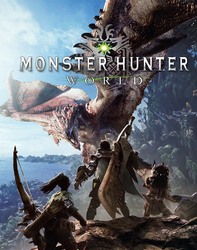Monster Hunter: World: Difference between revisions
| Line 26: | Line 26: | ||
==Monsters== | ==Monsters== | ||
''Main article: [[MHWorld: Monsters|Monsters in Monster Hunter: World]]''<br><br> | |||
Monster Hunter: World featured '''16 small monsters''' and '''30 large monsters at launch'''.<br> 6 additional large Monsters - [[Deviljho]], [[Lunastra]], [[Leshen]], [[Ancient Leshen]], [[Behemoth]] and [[Kulve Taroth]] - were added via Title Updates after the games' release. | |||
< | |||
< | |||
{{-}} | {{-}} | ||
==Locales== | ==Locales== | ||
List of the locales in the game. | List of the locales in the game. | ||
Revision as of 16:35, 14 August 2024
| Monster Hunter: World | |
|---|---|
 | |
| Publisher | Capcom |
| Director | Yuya Tokuda |
| Release | Playstation 4, Xbox One January 28 2018 PC August 9, 2018 |
| Platforms | |
| Playstation 4 Xbox One PC | |
| Flagship Monster | |
| None | |
| [[{{{Gen}}}]] | |
Monster Hunter: World is an online hunting action game for the PlayStation 4 and Xbox One gaming platforms which released on January 28th 2018 worldwide, and the fifth mainline game in the Monster Hunter series. A Steam version for PC was released on August 9th 2018.
Premise & Story
The player takes on the role of a hunter traveling to the New World as part of the Research Commission, tasked with exploring the new continent. This uncharted land is home to a phenomenon known as the Elder Crossing, where powerful Elder Dragons migrate to this region for unknown reasons. As the Commission follows the traces of the gargantuan Elder Dragon Zorah Magdaros, the truth behind this new world reveals itself step by step.
Gameplay
Like in previous games, the gameplay of Monster Hunter: World revolves around the player hunting monsters, using their materials to craft new armor and weapons, which then allow for the hunting of new, stronger monsters using a real time action combat system. However, Monster Hunter: World presents various drastic changes to just about every facet of the game outside of that core loop.
Key Features
Faster, more accessible Gameplay
Monster Hunter: World features a quickened pace of action gameplay that allows players to react quicker to monster attacks, chain together combos more freely and move faster in general. Every weapon has its moveset altered in service of this general change, and players are on average less committed to each combat action/animation. This extends to the use of items as well: Many can be used while moving, and the time the player is left vulnerable while using them has been reduced compared to previous games. Consequently, Monsters have been made faster and more aggressive to maintain an adequate degree of challenge.
Open Maps without Loading Screens
One of the most significant changes Monster Hunter: World makes to the series pertains to the design of the Hunting Ground maps. Whereas in previous games, a map consisted of singular zones separated by a loading screen transition, the maps of Hunting Grounds in Monster Hunter: World are fully interconnected and traversible with no interruptions. This has wide-reaching effects on the gameplay, as both players and Monsters can roam these areas freely. The maps also display an increased degree of verticality, with multiple layers of elevation.
Additionally, the player can now unlock additional campsites on each map, allowing them to fast travel when not in combat. The player can also enter these Hunting Grounds without needing to accept a Quest, through a feature called Expeditions. When on an Expedition, the player can stay in a map for an indefinite amount of time, and will not be punished for fainting. However, hunting Monsters through Expeditions yields fewer rewards than if it is done within a designated Quest. Each Hunting Ground is still separate from all other Hunting Grounds, and they cannot be seamlessly accessed between eachother.
Monsters
Main article: Monsters in Monster Hunter: World
Monster Hunter: World featured 16 small monsters and 30 large monsters at launch.
6 additional large Monsters - Deviljho, Lunastra, Leshen, Ancient Leshen, Behemoth and Kulve Taroth - were added via Title Updates after the games' release.
Locales
List of the locales in the game.
Development
Description of the games development. Source whenever possible.
Here is how you use sources[1].
Here is how to use[2] the same source multiple times[2].
Regional Differences
Description of any regional differences. Think MH1JP vs MH1US.
Reception
Description of the critical and commercial reception of the game.
Trivia
Various fun facts about the game.
- Arranged in a bullet list like this.